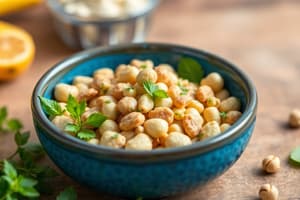Podcast
Questions and Answers
What is the primary purpose of probiotics in human nutrition?
What is the primary purpose of probiotics in human nutrition?
- To act as a magic bullet for all diseases
- To restore and establish a balanced microbiota (correct)
- To enhance the flavor of food
- To introduce synthetic nutrients into the diet
Which probiotic genus is NOT mentioned as predominantly present in human probiotic microorganisms?
Which probiotic genus is NOT mentioned as predominantly present in human probiotic microorganisms?
- Bifidobacterium
- Clostridium (correct)
- Saccharomyces
- Lactobacillus
How do probiotics confer benefits related to pathogens?
How do probiotics confer benefits related to pathogens?
- By producing synthetic antibiotics
- By competing for nutrients and adhesion sites (correct)
- By attacking the host immune system
- By increasing pathogen virulence
Which of the following conditions has shown a clinical benefit from probiotics?
Which of the following conditions has shown a clinical benefit from probiotics?
What is one of the mechanisms by which probiotics exert their beneficial effects?
What is one of the mechanisms by which probiotics exert their beneficial effects?
What is the impact of probiotics on colorectal carcinoma based on animal studies?
What is the impact of probiotics on colorectal carcinoma based on animal studies?
In what way do probiotics affect inflammatory bowel diseases?
In what way do probiotics affect inflammatory bowel diseases?
What is a potential risk factor to consider before modulating gut microbiota with probiotics?
What is a potential risk factor to consider before modulating gut microbiota with probiotics?
What is a characteristic of prebiotics?
What is a characteristic of prebiotics?
Which of the following criteria is NOT a selection criterion for prebiotics?
Which of the following criteria is NOT a selection criterion for prebiotics?
Which of the following is a common prebiotic used in human nutrition?
Which of the following is a common prebiotic used in human nutrition?
What general health benefit is associated with prebiotics?
What general health benefit is associated with prebiotics?
Which microorganisms are primarily increased by the consumption of fermentable dietary fibers?
Which microorganisms are primarily increased by the consumption of fermentable dietary fibers?
What is one proposed model for how prebiotics may affect immune function?
What is one proposed model for how prebiotics may affect immune function?
Which of the following foods is least likely to be a source of prebiotics?
Which of the following foods is least likely to be a source of prebiotics?
Which health effect is NOT attributed to the presence of prebiotics in the diet?
Which health effect is NOT attributed to the presence of prebiotics in the diet?
What type of diarrhea was particularly treated with Saccharomyces boulardii yeast?
What type of diarrhea was particularly treated with Saccharomyces boulardii yeast?
Which probiotic strain was noted to be effective specifically for Clostridium difficile disease?
Which probiotic strain was noted to be effective specifically for Clostridium difficile disease?
How do probiotics contribute to improved gastrointestinal health in cancer patients?
How do probiotics contribute to improved gastrointestinal health in cancer patients?
What effect do probiotics have on the prevalence of eczema in infants?
What effect do probiotics have on the prevalence of eczema in infants?
Which of the following is NOT a documented effect of probiotics?
Which of the following is NOT a documented effect of probiotics?
Regular use of probiotics has shown a positive impact on which type of infections?
Regular use of probiotics has shown a positive impact on which type of infections?
What health outcomes have probiotics been associated with in patients with Type 2 Diabetes?
What health outcomes have probiotics been associated with in patients with Type 2 Diabetes?
The administration of probiotics has been shown to alleviate which of the following conditions in children with cystic fibrosis?
The administration of probiotics has been shown to alleviate which of the following conditions in children with cystic fibrosis?
What is the primary role of short-chain fatty acids (SCFAs) such as butyric acid in the gastrointestinal system?
What is the primary role of short-chain fatty acids (SCFAs) such as butyric acid in the gastrointestinal system?
What is the main purpose of combining prebiotics with probiotics in synbiotics?
What is the main purpose of combining prebiotics with probiotics in synbiotics?
Which of the following effects is NOT associated with the use of synbiotics?
Which of the following effects is NOT associated with the use of synbiotics?
How do gut microbiota-associated metabolites influence human health?
How do gut microbiota-associated metabolites influence human health?
What is a consequence of using prebiotics with probiotics?
What is a consequence of using prebiotics with probiotics?
Which health benefit is associated with synbiotics in patients post-surgery?
Which health benefit is associated with synbiotics in patients post-surgery?
Which characteristic of metabolites makes them relevant therapeutic candidates?
Which characteristic of metabolites makes them relevant therapeutic candidates?
What is a significant finding regarding the effect of prebiotics on lymphocyte and leukocyte counts?
What is a significant finding regarding the effect of prebiotics on lymphocyte and leukocyte counts?
Flashcards
Probiotics and Cancer
Probiotics and Cancer
Probiotics, live microorganisms that benefit the host, have been shown to improve gut health in cancer patients. They can enhance the gut barrier, reduce diarrhea, and decrease abdominal discomfort.
Probiotics
Probiotics
Live microorganisms that confer health benefits when consumed in adequate amounts. They are often used to restore balance in the gut microbiome.
Probiotics for Diarrhea
Probiotics for Diarrhea
Probiotics, particularly Saccharomyces boulardii, have proven effective in treating acute watery diarrhea. They can reduce the frequency and duration of diarrhea symptoms.
Prebiotics
Prebiotics
Signup and view all the flashcards
Probiotics and Antibiotic-Associated Diarrhea
Probiotics and Antibiotic-Associated Diarrhea
Signup and view all the flashcards
Gut Microbiome
Gut Microbiome
Signup and view all the flashcards
Probiotics and Extraintestinal Infections
Probiotics and Extraintestinal Infections
Signup and view all the flashcards
Modulation of the Gut Microbiome
Modulation of the Gut Microbiome
Signup and view all the flashcards
Probiotics and Metabolic Disorders
Probiotics and Metabolic Disorders
Signup and view all the flashcards
Synbiotic
Synbiotic
Signup and view all the flashcards
Probiotics and Type 2 Diabetes
Probiotics and Type 2 Diabetes
Signup and view all the flashcards
Fecal Microbiota Transplantation (FMT)
Fecal Microbiota Transplantation (FMT)
Signup and view all the flashcards
Probiotics and Atopic Dermatitis
Probiotics and Atopic Dermatitis
Signup and view all the flashcards
Probiotic Applications
Probiotic Applications
Signup and view all the flashcards
Phage Therapy
Phage Therapy
Signup and view all the flashcards
microRNA (miRNA)
microRNA (miRNA)
Signup and view all the flashcards
What are prebiotics?
What are prebiotics?
Signup and view all the flashcards
What makes a substance a prebiotic?
What makes a substance a prebiotic?
Signup and view all the flashcards
Can you name some common prebiotics?
Can you name some common prebiotics?
Signup and view all the flashcards
How do prebiotics impact gut bacteria?
How do prebiotics impact gut bacteria?
Signup and view all the flashcards
What are the health benefits of prebiotics?
What are the health benefits of prebiotics?
Signup and view all the flashcards
How might prebiotics influence the liver?
How might prebiotics influence the liver?
Signup and view all the flashcards
Where can you find prebiotics in your diet?
Where can you find prebiotics in your diet?
Signup and view all the flashcards
What is the difference between prebiotics and dietary fiber?
What is the difference between prebiotics and dietary fiber?
Signup and view all the flashcards
What are SCFAs?
What are SCFAs?
Signup and view all the flashcards
How do SCFAs influence gene expression?
How do SCFAs influence gene expression?
Signup and view all the flashcards
What are prebiotics and their effect on the gut?
What are prebiotics and their effect on the gut?
Signup and view all the flashcards
What are synbiotics and their purpose?
What are synbiotics and their purpose?
Signup and view all the flashcards
What is a health benefit of synbiotics?
What is a health benefit of synbiotics?
Signup and view all the flashcards
How do synbiotics impact the immune system?
How do synbiotics impact the immune system?
Signup and view all the flashcards
What are metabolites and their significance?
What are metabolites and their significance?
Signup and view all the flashcards
How are metabolites applied in therapeutic contexts?
How are metabolites applied in therapeutic contexts?
Signup and view all the flashcards
Study Notes
Prebiotics, Probiotics, and Gut Microbiome Modulation
- Prebiotics, probiotics, and next-generation pharmaceuticals are strategies to modulate the gut microbiome.
- The slides discuss the role of these methods in human health.
- Not all diet benefits are universally recognized as accurate.
- There is no one-size-fits-all "magic bullet" diet.
- Modulating the microbiota through diet or treatment is possible.
Therapeutic Strategies
- Prebiotics, probiotics, synbiotics, fecal microbiota transplantation (FMT), phage therapy, and miRNA modulation are therapeutic strategies.
- There are strategies that can help regulate the gut microbiota
- The goal of these strategies is improving gut health.
Selecting Probiotic Strains
- Probiotics are live microorganisms that provide health benefits when administered in adequate amounts.
- Probiotic strains need to meet certain criteria for safety and functionality.
- Criteria include human or animal origin, isolation from healthy individuals, a history of safe use, precise identification (phenotype and genotype), absence of data linking the strain to infectious diseases, absence of bile acid-salt cleaving ability, lack of adverse effects, resistance to bile salts and enzymes, and ability to colonize the target site in the gut.
Probiotic Microorganisms
- Lactobacillus, Bifidobacterium, Lactococcus, Streptococcus, Enterococcus, Bacillus, and Saccharomyces are common human probiotic genera.
Mechanism of Beneficial Effects
- Probiotics exhibit multiple mechanisms, including antagonism through antimicrobial substances, competition with pathogens for nutrients and adhesion, and modulation of the host's immune and metabolic systems.
- They inhibit bacterial toxin production
Probiotics and Inflammatory Bowel Diseases
- Probiotic use may help with ulcerative colitis, but not Crohn's disease.
- Probiotics can significantly reduce lactose intolerance
- They may help treat irritable bowel syndrome symptoms.
Probiotics and Cancer
- Animal studies show probiotics reducing colorectal cancer risk.
- Similar effects not consistently observed in human clinical trials.
- Probiotics can alleviate gastrointestinal disorders in cancer patients.
- Some improvement in gut mucosal barrier function with probiotics.
Probiotics and Diarrheal/Intestinal Infections
- Saccharomyces boulardii yeast is effective in treating acute watery diarrhea.
- Probiotics also curb nosocomial, non-nosocomial, and viral diarrhea.
- Treatment may prevent infection development through elevated IgA antibody concentration.
Probiotics and Extraintestinal Infections
- Probiotics have positive effects on vaginitis and respiratory tract infections.
- They curb exacerbations in cystic fibrosis and nosocomial infections (including VAP).
Probiotics and Metabolic Disorders
- Probiotic administration may lower BMI, arterial blood pressure, CRP levels, and improve lipid profiles and insulin sensitivity in obese individuals.
Probiotics and Atopic Dermatitis
- Using probiotics in pregnant women and their infants can reduce eczema prevalence in infants.
- Probiotics can improve symptoms of atopic dermatitis, specifically improving the ratio of IFN-γ to IL-10.
Prebiotics:
- Substances in food not digestible by the human body but support beneficial microorganisms.
- Prebiotics have resistance to digestion.
- They undergo fermentation and stimulate beneficial gut microorganism growth
- Prebiotics include ingredients like Dietary fiber, Fructooligosaccharides (FOS), galactooligosaccharides (GOS), inulin, xylooligosaccharides (XOS), lactitol, lactosucrose, and soy oligosaccharides.
Synbiotics
- Synbiotics include prebiotics and probiotics.
- Synbiotics improve probiotic survival in the gastrointestinal tract.
- They promote native gut microbiota growth
- They are more tolerant of environmental factors in the gut (pH, oxygen, temperature).
- There are clinical trials to support their use for obesity, diabetes, inflammatory syndrome, atopic dermatitis, and intestinal issues.
Metabolites
- Gut microbiome-associated metabolites help modulate human diseases.
- They are used in local inflammation, and cardiometabolic and neurological treatments.
- Beneficial candidates are naturally available, easily administered, and tolerated by the body. The gut microbiota products display anti-inflammatory properties.
SCFAs
- SCFAs have anti-inflammatory effects.
- Oral administration can relieve symptoms of brain inflammation and autoimmune diseases.
Other Novel Approaches
- MicroRNAs (miRNAs) help maintain homeostasis through gene expression.
- Hyaluronan helps promote and resolve inflammatory bowel disease (IBD).
- Nanomaterials can treat cancer by targeting dysbiotic microorganisms and metabolites.
Studying That Suits You
Use AI to generate personalized quizzes and flashcards to suit your learning preferences.




